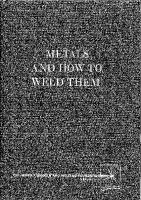Tie-In and Golden Weld
Golden Welds • In pipeline and piping networks, the joints which you are not capable to carry out the hydrostatic test s
Views 119 Downloads 0 File size 74KB
Recommend stories
- Author / Uploaded
- saffririzal4237
Citation preview
Golden Welds • In pipeline and piping networks, the joints which you are not capable to carry out the hydrostatic test shall be tested by any other means like full RT, … etc. Those joints are generally referred as Golden Joints. These joints may come especially making tie-in's of for two hydro test of sections. • So, we have to compensate hydrostatic test by any additional NDT as follows: Option 1: Root 100% DPT, Every layer of weld with 100% DPT, Final run 100% DPT and 100 % UT. Option 2: Root 100% DPT and 100 % RT • I think that there is no specific code for Golden Joint but most of the companies/workshops are follow to perform a Golden Weld, with 100% NDT in lieu of hydro test. • We can refer ASME 31.4, and it permits a "waiver" of a hydrostatic test on tie-in welds between two sections of piping, that the weld has already undergone 100% NDT [see Para. 437.1.4 (b) Testing Tie-ins, ASME B31.4 - Ed. 2009].
Tie-In and Golden Weld
Having been recently involved deeply in this subject, let me give you the long version - bear with me - all pipelines, flowlines and risers fabricated in accordance with API 1104 (all welds on API 1104 pipelines, flowlines and risers must be 100% radiographed or ultrasonically tested), must be hydrotested in accordance with API 1110 (maybe other codes depending on your location), which in turn refer to ASME B31.4 or 31.8. ASME 31.4 permits a "waiver" of a hydrotest on “tie-in” welds between two sections of piping that have been previously tested in accordance with the code provided that the weld has undergone 100% NDT (see Section 437.1.4 (b) Testing Tie ins, ASME B31.4 2002 Edition). Now, if you are talking about plant piping, very similar. All piping fabricated in accordance with ASME B31.3 must be hydrotested in accordance with ASME B31. The latest edition of B31.3 permits the same waiver of a hydrotest as 31.4 on “Tie-in” welds between two sections of piping that have been previously tested in accordance with the code. ASME B31.3 only requires 5% random radiography (or UT) on piping in “Normal Fluid Service” (which means hydrocarbon service up to 2500 flange rating) You didn't ask, but will throwi n that API RP14E, only recommends 10% radiography on class 150 to 600lb ANSI rated flanges, 20% on 900 to 1500lb ANSI rated flanges and 100% on 2500 and above. Most companies will have a procedure to perform a "golden weld", but at the end of the day it's what we always referred to as a final tie-in and basically you do a 100% RT or UT NDT on the weld in lieu of pressure testing it.









